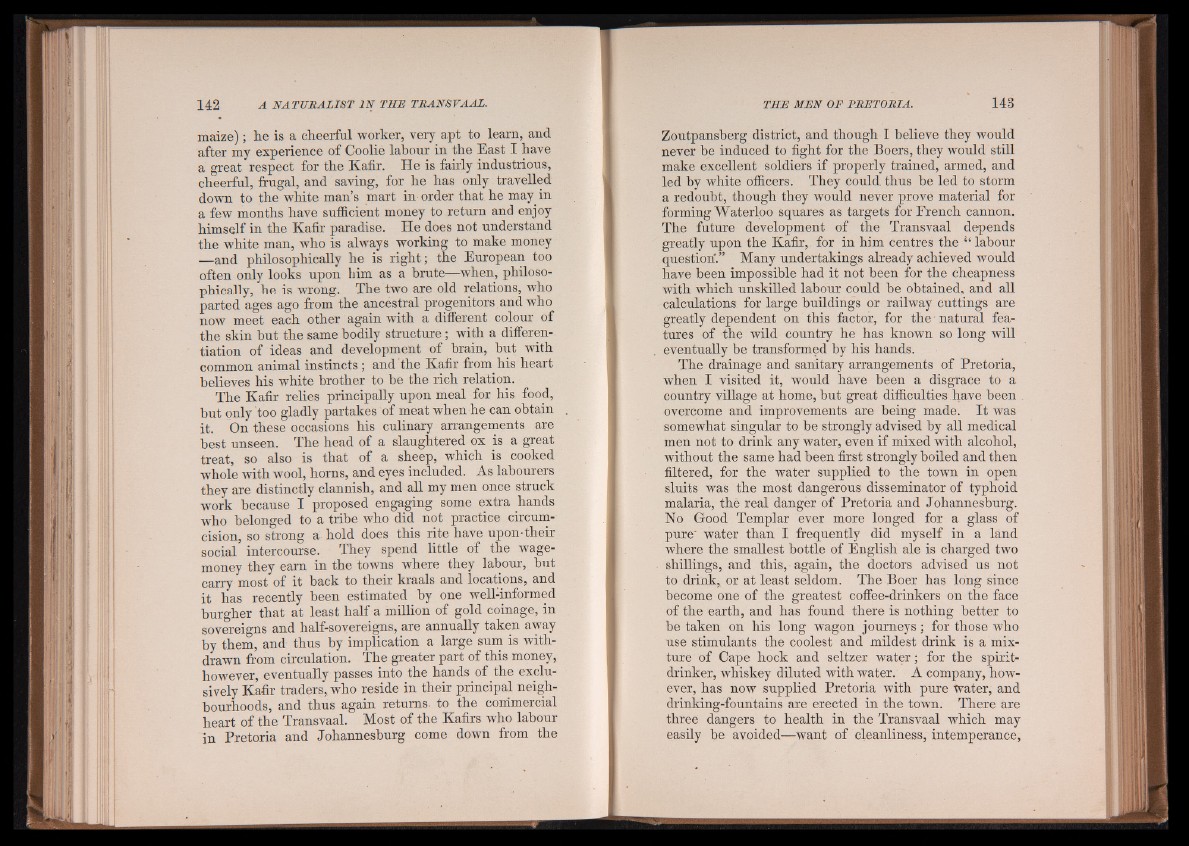
maize); he is a cheerful worker, very apt to learn, and
after my experience of Coolie labour in the East I have
a great respect for the Kafir. He is fairly industrious,
cheerful, frugal, and saving, for he has only travelled
down to the white man’s mart in order that he may in
a few months have sufficient money to return and enjoy
himself in the Kafir paradise. He does not understand
the white man, who is always working to make money
—and philosophically he is right; the European too
often only looks upon him as a brute—when, philosophically,
he is wrong. The two are old relations, who
parted ages ago from the ancestral progenitors and who
now meet each other again with a different colour of
the skin but the same bodily structure; with a differentiation
of ideas and development of brain, but with
common animal instincts; and the Kafir from his heart
believes his white brother to be the rich relation.
The Kafir relies principally upon meal for his food,
but only too gladly partakes of meat when he can obtain
it. On these occasions his culinary arrangements are
best unseen. The head of a slaughtered ox is a great
treat, so also is that of a sheep, which is cooked
whole with wool, horns, and eyes included. As labourers
they are distinctly clannish, and all my men once struck
work because I proposed engaging some extra hands
who belonged to a tribe who did not practice circumcision,
so strong a hold does this rite have upon-their
social intercourse. They spend little of the wage-
money they earn in the towns where they labour, but
carry most of it back to their kraals and locations, and
it has recently been estimated by one well-informed
burgher that at least half a million of gold coinage, in
sovereigns and half-sovereigns, are annually taken away
by them, and thus by implication a large sum is withdrawn
from circulation. The greater part of this money,
however, eventually passes into the hands of the exclusively
Kafir traders, who reside in their principal neighbourhoods,
and thus again returns- to the commercial
heart of the Transvaal. Most of the Kafirs who labour
in Pretoria and Johannesburg come down from the
Zoutpansberg district, and though I believe they would
never be induced to fight for the Boers, they would still
make excellent soldiers if properly trained, armed, and
led by white officers. They could thus be led to storm
a redoubt, though they would never prove material for
forming Waterloo squares as targets for French cannon.
The future development of the Transvaal depends
greatly upon the Kafir, for in him centres the f| labour
question'.” Many undertakings already achieved would
have been impossible had it not been for the cheapness
with which unskilled labour could be obtained, and all
calculations for large buildings or railway cuttings are
greatly dependent on this factor, for the natural features
of the wild country he has known so long will
eventually be transformed by his hands.
The drainage and sanitary arrangements of Pretoria,
when I visited it, would have been a disgrace to a
country village at home, but great difficulties have been
overcome and improvements are being made. I t was
somewhat singular to be strongly advised by all medical
men not to drink any water, even if mixed with alcohol,
without the same had been first strongly boiled and then
filtered, for the water supplied to the town in open
sluits was the most dangerous disseminator of typhoid
malaria, the real danger of Pretoria and Johannesburg.
No Good Templar ever more longed for a glass of
pure' water than I frequently did myself in a land
where the smallest bottle of English ale is charged two
shillings, and this, again, the doctors advised us not
to drink, or at least seldom. The Boer has long since
become one of the greatest coffee-drinkers on the face
of the earth, and has found there is nothing better to
be taken on his long wagon journeys; for those who
use stimulants the coolest and mildest drink is a mixture
of Cape hock and seltzer water; for the spirit-
drinker, whiskey diluted with water. A company, however,
has now supplied Pretoria with pure Water, and
drinking-fountains are erected in the town. There are
three dangers to health in the Transvaal which may
easily be avoided—want of cleanliness, intemperance,